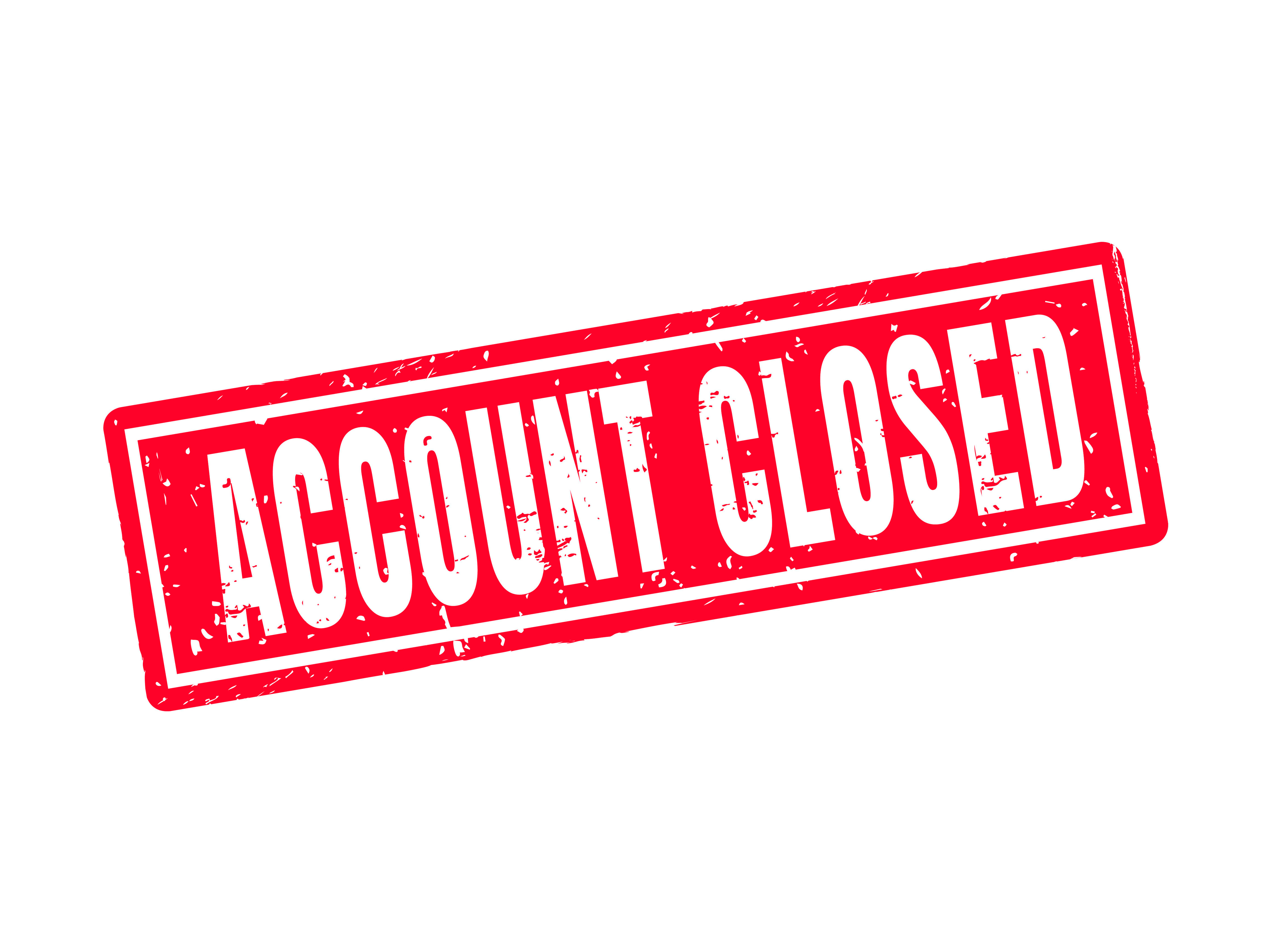Does Closing Bank Accounts Negatively Affect Your Banking History?

No – simply closing a bank account doesn’t negatively impact your rating with any of the bank history reporting agencies, including ChexSystems, Early Warning Services (EWS), TeleCheck or the Federal Deposit Insurance Corporation (FDIC).
The exception is when an account that had a negative account balance is closed, but banks typically won’t allow customers to close accounts with a negative balance prior to the account being settled.
Failure to settle an account or simply trying to avoid a negative balance or unpaid fees may cause the bank or credit union to pursue collection efforts against you. If an account is automatically shut down due to having an unsettled negative balance, it will be reported to ChexSystems and appear on your bank history report, which will make it difficult to open new accounts in the near future.
What If an Account Had Outstanding Fees or Debts When It Was Closed?
If an account with outstanding debts or fees attributed to it is closed, either automatically by the bank or by the account holder, it may negatively affect your bank history report. Checking or savings accounts closed due to suspected fraud or fraud attempts may also be reported to ChexSystems, EWS or TeleCheck.
What Types of Behavior Can Influence Your ChexSystems or Other Bank History Reports?
Different agencies are focused on specific aspects of banking behavior. ChexSystems arguably has the broadest reporting portfolio as they track a host of actions, including overdrafts, account closures due to misuse, unpaid negative balances, bounced checks and suspected fraud or identity theft.
Early Warning Services (EWS) is more focused on fraudulent activity and account abuse. This remit extends into check verification or attempts to defraud businesses by passing fake checks, but they also track new account inquiries, or the frequency with which people attempt to open new accounts. This is because someone who is attempting to commit check fraud may seek to open many accounts to get access to a lot of checks from different institutions.
TeleCheck focuses solely on checks rather than account behaviors more generally. They track things like the number of returned unpaid checks a person has written, check-related fraud and check verification inquiries, or how many times businesses have contacted a bank to confirm a consumer has the ability to pay prior to accepting their check.
There is quite a bit of overlap with these reporting agencies, especially when it comes to check-related fraud or financial mismanagement that leads to a high volume of bounced checks.
What Can You Do to Safeguard Your Banking History Reports?
First and foremost, these agencies are on the lookout for banking fraud of different types. Many people who cash or bounce checks are caught, reported and face prosecution or punitive actions from banks. It’s best not to participate in those types of activities.
ChexSystems in particular tracks behavior that can happen accidentally. Many banking consumers have, at some point in their life, accidentally overdrawn their account or had outstanding unpaid fees related to their checking account use. Those activities are not fraud and don’t warrant punitive actions, but they can negatively influence your banking history report.
Maintaining Sustainable and Responsible Check Account Use
- Use mobile banking to keep an eye on your account balances, especially before you go shopping or make a purchase. Depending on the platform you use, you may be able to set up alerts to warn you if your balance gets low.
- Some banks and credit unions allow you to opt out of services like overdraft protection or Courtesy Pay. If you’d rather not have the option in order to avoid the associated fees, you may want to turn off the feature (if you’re an OnPath member, you can opt out of Courtesy Pay for some or all services by calling us at 800.749.6193).
- Banks and credit unions, including OnPath Federal Credit Union, allow funds to be automatically transferred from your savings account to cover potential overdrafts and prevent the associated fees or penalties.
- Before you ever sign up for an account, it’s worth taking the time to read through the policies and potential fees associated with different account actions or features. Understanding those costs upfront can help prevent you from being charged fees or penalties you weren’t expecting and don’t have the resources to pay.
- If you do run into issues, don’t hesitate to get in touch with your bank or credit union as soon as possible. They can be flexible, especially local community credit unions, and help you find solutions to prevent damage to your banking history and avoid debts related to unpaid fees or negative balances.
- Check your account statements each month. If you notice unauthorized transactions or inaccuracies, contact your bank or credit union right away. Customers are their own best advocates, and the earlier you can catch issues, the less likely they are to cause damage to your banking history.
Are You Looking for a Second Chance?
OnPath Federal Credit Union is committed to providing solutions for members or banking customers who may be having difficulty opening a checking account due to their banking history report. That’s why we’ve introduced our Rise Checking second chance checking account. You can get many of the features of our other checking products, including a debit card, with Rise Checking. You also may be able to transition to a normal checking account within one year if the account remains in good standing.
Our second chance checking offers a faster, easier and safer way to get back to normal if your banking history is holding you back. Call us at 800.749.6193 to learn more.